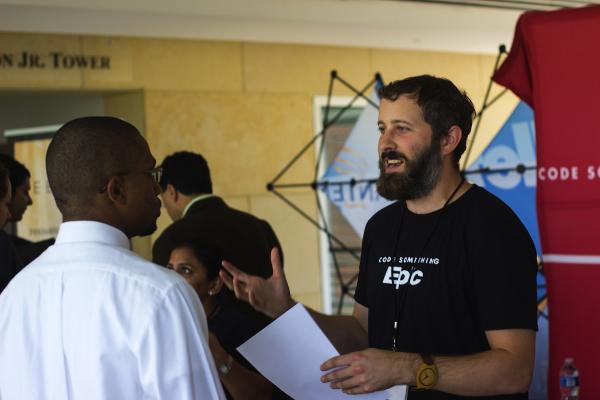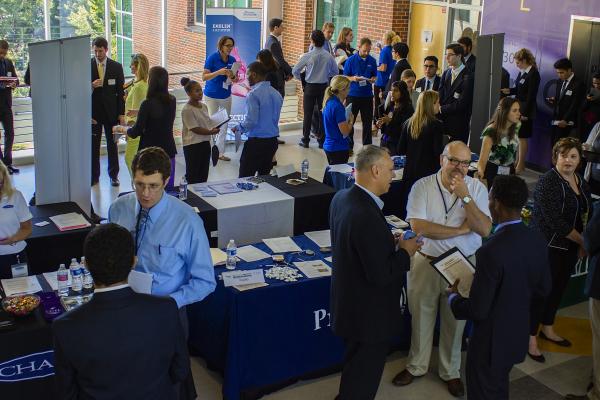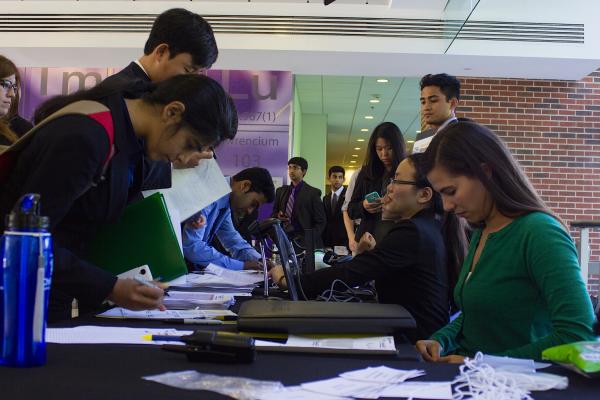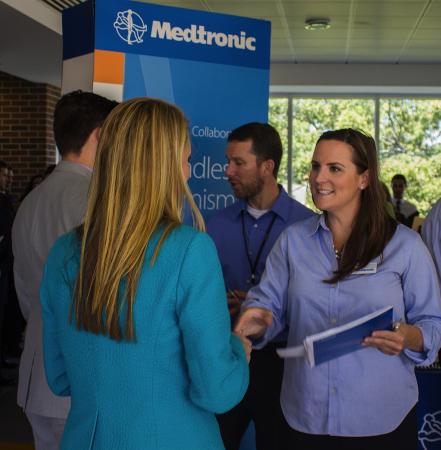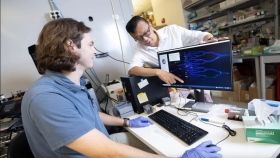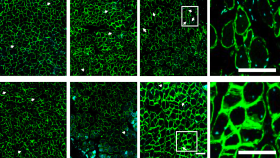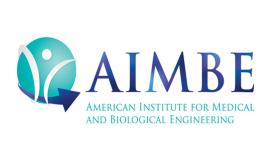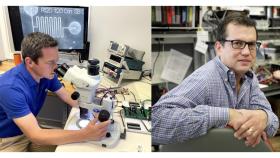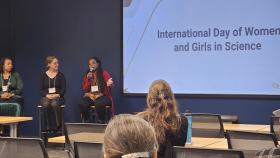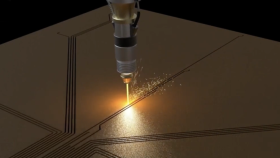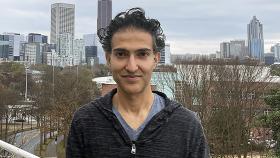There are some fall traditions at the Georgia Institute of Technology that have become established symbols of the season, sending a communal buzz across campus.
There’s football, of course – crisp Saturdays at Bobby Dodd Stadium; there are the food trucks, returning in full force like migratory birds along Atlantic Drive and Tech Green; and for the last 11 years, there has been the Biotechnology Career Fair, proactively throwing open windows of opportunity for students and companies alike in one of Georgia Tech’s most anticipated annual events.
“This has become one of those win-win situations, an experience that benefits both students and prospective employers,” says Sally Gerrish, coordinator of the event as director of Student, Alumni and Industry Relations for the Wallace H. Coulter Department of Biomedical Engineering (BME).
The Coulter Department, a joint department of Emory University and Georgia Tech, served as host of the fair in the Molecular Science and Engineering Building (in September, per usual), bringing 514 students (mostly undergraduates) together with 25 companies that were seeking to fill internships and full-time positions.
Also, five corporate sponsors supported the effort. The attendance and the number of sponsors were both record highs.
Making all of the moving parts work together at the fair was a committee of 13 students, “who really ran the fair and did a phenomenal job,” Gerrish says. “They’re responsible for everything – recruiting volunteers, contacting industry partners, organizing pre-fair events.”
These pre-fair events are aimed at preparing students for the job search, for building relationships with potential employers.
“We want students to have a successful experience at the fair,” says Liane Tellier, co-chair of the Career Fair Committee.
To do that, the committee helps participating students through pre-fair events and info sessions focused on creating resumes, alerting students of the job opportunities at various companies, preparing for interviews, and networking with alumni who have been through all of those drills already.
“We’d like to ensure that the career fair also offers a wide variety of career options for our qualified student population,” notes Charles Ge, who also co-chaired the committee.
So this year, the committee assembled a wide range of companies in biotech-related fields, ranging from medical device companies (Medtronic, for example), medical products (like Johnson & Johnson), and institutes of higher education and training (such as Keck Graduate Institute).
In addition to those, the who’s who list of companies and organizations at the fair included C.R. Bard, Becton Dickinson, Chart Industries, Clarkston Consulting, Epic, Eppendorf North America, Halyard Health, Georgia Bio-Emerging Leaders Network, Huron Consulting Group, Pabst Patent Group LLP, Procter & Gamble, QGenda, Sebacia, Inc., Southern Spine LLC, Stryker Orthopaedics, Universal Hospital Services, Inc., and W.L. Gore & Associates, Inc. Sponsoring the event and also on hand were Boston Scientific, PrepMD, St. Jude Medical, T3 Labs and the Woodrow Wilson Foundation.
“The fair is a wonderful opportunity for companies to visit our university and become aware of the highly talented students that we graduate,” says James Rains, professor of practice and director of the BME Capstone program.
For students, he says, “its a rare opportunity to meet with companies that are competing in the healthcare industry.”
Gerrish remembers when the event drew only 250 students. It’s more than doubled in size, and has grown in scope also, attracting mostly BME students, but also students from almost every other engineering discipline.
“We have a growing number of students from different majors,” Gerrish says. “ which is great, because this event is really for any student on campus interested in biotechnology,” Gerrish says.
Rains listened closely to company feedback at the event, and was happy to report, “they are amazed to find so many students that are both intelligent and engaging – a rare combination for engineers,” he says. “They also noted that our program is unique because we prepare our students to be immediate contributors within an organization, making them highly attractive as potential hires.”
CONTACT:
Jerry Grillo
Communications Officer II
Parker H. Petit Institute for
Bioengineering and Bioscience
Media Contact
Jerry Grillo
Communications Officer II
Parker H. Petit Institute for
Bioengineering and Bioscience

